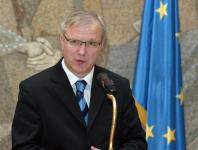 Many Bosnia and Herzegovina politicians have failed to read EU Enlargement Commissioner Olli Rehn’s message to them on visa-liberalisation.
Many Bosnia and Herzegovina politicians have failed to read EU Enlargement Commissioner Olli Rehn’s message to them on visa-liberalisation.
“Deputies in the House of Representatives of the state parliament have yesterday proven once again their flippancy and irresponsibility towards their voters, as well as towards the messages that come from the European Union,” Sarajevo daily Dnevni Avaz wrote on Sunday.
In a quick survey conducted over the weekend, the newspaper concluded that only a few Bosnian leaders have actually read Rehn’s written message to them. The commissioner was supposed to deliver this message in his address to the Bosnian parliament on Friday but, due to sudden health problems, canceled all scheduled meetings and left the Bosnian capital early.
Rehn toured the Balkans last week in an attempt to promote the acceleration of reforms required of regional states to enter the EU’s visa-free regime. The visit came one week after the European Commission presented its travel liberalisation proposal for the Balkans, which suggests granting visa-free status to Macedonia, Montenegro and Serbia, but excludes Albania, Bosnia and Kosovo.
The exclusion of Bosnia has been controversial, with Serbia granted access to the visa-free scheme and Bosnia left out despite the fact that the two countries are almost at the same level of implementation of the required reforms.
Yet, local and international criticism has also been aimed at Bosnian leaders due to the fact that reforms required for inclusion in the visa-free regime could have been implemented much faster had there been less political infighting.
“These are difficult times for Bosnia and Herzegovina. The economy is hurting and ordinary people are struggling to make ends meet,” Rehn said in his message, which was distributed to local leaders and media over the weekend.
“Many are disappointed that Bosnia and Herzegovina failed to qualify for visa-liberalisation in the first round because of shortcomings in meeting the EU’s security standards,” he wrote, adding: ”The EU wants all the people of the Western Balkans to travel freely in Europe.”
Rehn welcomed the progress achieved so far in achieving the required reforms but stressed that a bit more work is needed. A list of some 50 remaining issues was delivered to Bosnia’s Security Ministry last week. Bosnian leaders have until October to see these implemented and to report back to the EU. If this is achieved, the country could be recommended for visa-liberalisation in 2010, Rehn said.
“You do your part, we do our part. That is fair play,” he said.
But some Bosnian leaders apparently failed to do their part and even read Rehn’s message. Dnevni Avaz named several local politicians who admitted they hadn’t read Rehn’s planned address and therefore could not comment thereon. Some explained that it was because the translation was still not provided, while others tried to excuse themselves with the fact that they were already on summer vacation. Many local leaders could not even be contacted, presumably because they were already on holiday, the newspaper concluded.
 Eurasia Press & News
Eurasia Press & News


